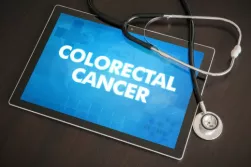NORTH CHICAGO, IL — AbbVie announced that the European Medicines Agency's (EMA) Committee for Medicinal Products for Human Use (CHMP) has adopted a positive opinion recommending the conditional marketing authorization of epcoritamab (TEPKINLY), the first and only T-cell engaging bispecific antibody administered subcutaneously (under the skin), as a monotherapy for the treatment of adult patients with relapsed or refractory (R/R) follicular lymphoma (FL) after two or more prior therapies. The European Commission decision on this indication for epcoritamab is anticipated later this year.
"Patients with follicular lymphoma are likely to face disease recurrence and shorter durability of response with each subsequent line of treatment. This positive opinion recognizes the unmet need in the European Union for individuals with relapsed or refractory follicular lymphoma, following failure of other therapies," said Mariana Cota Stirner, M.D., Ph.D., vice president, therapeutic area head for hematology, AbbVie.
FL is typically an indolent (or slow-growing) form of non-Hodgkin's lymphoma (NHL) that arises from B-lymphocytes and is the second most common form of NHL accounting for 20-30% of all cases. In 2023, there were an estimated 13,000 cases of FL in Western Europe. FL is considered incurable with current standard of care therapies.
The CHMP opinion is supported by overall and complete response data from the Phase 1/2 EPCORE NHL-1 clinical trial in 128 patients with R/R FL treated with epcoritamab after two or more lines of prior therapy. The study included patients who were refractory to both anti-CD20 monoclonal antibody therapy and an alkylating agent, patients who were refractory to last prior treatment, and patients whose disease progressed within two years of first systemic therapy. The safety profile of epcoritamab in the pivotal cohort was similar to reports of epcoritamab monotherapy in the pivotal EPCORE NHL-1 diffuse large B-cell lymphoma (DLBCL) cohort.
An additional cohort of 86 patients evaluated a 3-step-up dosing (SUD) schedule to reduce the incidence and severity of cytokine release syndrome (CRS), which is an associated adverse effect from immune-engaging cancer treatments. For the first full dose of this 3-step regimen, mandatory hospitalization was not required. In this cohort, the incidence of CRS was 49% (42 of 86 patients; 9% were grade 2). There were no grade 3 or higher CRS events. The data from this optimization cohort of the EPCORE NHL-1 study were recently published in the Lancet Haematology.
"Each year, thousands of people in Europe are diagnosed with follicular lymphoma, and it's an upsetting reality that many of them will experience relapse and refractory disease," said Catherine Thieblemont, M.D., Ph.D., head of the hemato-oncology department, Paris University, Hôpital Saint-Louis Assistance-Publique-Hopitaux de Paris (APHP) in Paris. "Patients deserve new treatment options, and this positive opinion is the first step to bringing epcoritamab to more patients who need it."
Epcoritamab is being co-developed by AbbVie and Genmab as part of the companies' oncology collaboration. The companies will share commercial responsibilities in the U.S. and Japan, with AbbVie responsible for further global commercialization. Both companies will pursue additional international regulatory approvals for the investigational R/R FL indication and additional approvals for the R/R DLBCL indication.
About the Phase 1/2 EPCORE NHL-1 Trial
EPCORE NHL-1 is an open-label, multi-center safety and preliminary efficacy trial of epcoritamab that consists of three parts: a dose escalation part; an expansion part; and an optimization part. The trial was designed to evaluate subcutaneous epcoritamab in patients with relapsed, progressive or refractory CD20+ mature B-cell non-Hodgkin's lymphoma (B-NHL), including FL. In the expansion part, additional patients were enrolled to further explore the safety and efficacy of epcoritamab in three cohorts of patients with different types of relapsed/refractory B-NHLs who have limited therapeutic options. The optimization part evaluates the potential for alternative step-up dosing regimens to help further minimize Grade 2 cytokine release syndrome (CRS) and mitigate Grade ≥3 CRS. The primary endpoint of the expansion part was ORR as assessed by an IRC. Secondary efficacy endpoints included duration of response, complete response rate, duration of complete response, progression-free survival, and time to response as determined by the Lugano criteria. Overall survival, time to next therapy, and rate of minimal residual disease negativity were also evaluated as secondary efficacy endpoints. The primary endpoint of the optimization part was the rate of ≥ Grade 2 CRS events and all grade CRS events from first dose of epcoritamab through 7 days following administration of the second full dose of epcoritamab.
Topline results of the study were shared in December 2023. More information can be found on www.clinicaltrials.gov (NCT03625037).
About Follicular Lymphoma (FL)
FL is typically an indolent (or slow-growing) form of non-Hodgkin's lymphoma (NHL) that arises from B-lymphocytes and is the second most common form of NHL accounting for 20-30% of all cases. FL is considered incurable with current standard of care therapies. Patients often relapse and with each relapse, the remission and time to next treatment is shorter. Over time, transformation to DLBCL, an aggressive form of NHL associated with poor survival outcomes, can occur in more than 25% of FL patients.
About Epcoritamab
Epcoritamab is an investigational IgG1-bispecific antibody created using Genmab's proprietary DuoBody technology and administered subcutaneously. Genmab's DuoBody-CD3 technology is designed to direct cytotoxic T cells selectively to elicit an immune response toward target cell types. Epcoritamab is designed to simultaneously bind to CD3 on T cells and CD20 on B cells and induces T-cell-mediated killing of CD20+ cells.
Epcoritamab (approved under the brand name EPKINLY in the United States and TEPKINLY in the European Union) has received regulatory approval in certain lymphoma indications in several countries.
AbbVie will continue to pursue regulatory submissions for epcoritamab across international markets. Both Genmab and AbbVie continue to evaluate the use of epcoritamab as a monotherapy and in combination across lines of therapy in a range of hematologic malignancies.



